Contents
Market Overview
Macro Review
Hard landing to soft landing to no landing. Hawkish Fedspeak from Mester and Bullard was unsurprising, but stronger economic data with CPI had set the scene. The improved market tone was reaffirmed by an upbeat PPI release that was the highest since March 2022. After a blowout NFP, several other indicators pointed to an improved growth picture and the Fed’s Atlanta GDPNow rose to 2.5% for 1Q. Expectations of Core PCE inflation have now risen to 0.55%, which has created further upside pressure on core rates in the near-term. As the Fed’s Williams had put it, there is sand in the gears of goods deflation. The December SEP on Fed Funds is currently at 5.1% and is set to be pushed up to 5.3%, which is where GS and BOA revised expectations to last week. The U.S. terminal rate has risen 44bps in February to 5.30% as U.S. Treasuries widened 60bps from the intra-month low of 3.32%. Unsurprisingly, the ETF tracking +20-year U.S. Treasuries (TLT) is down 4.4% over the past month. The Fed is also losing a dovish member, as Vice Chair Brainard is set to be appointed as Biden’s top economic advisor. Elsewhere, the Japanese government appointed Kazuo Ueda as BoJ Governor. Larry Summers’ had branded the incoming Governor as Japan’s Ben Bernanke. Yet, Ueda previously stated in 2022 that the long-term yield curve control isn’t suited for “policy tweaks” as once raised, there is simply speculation for another hike. A theme developing within EM is where governments are adopting IMF policies in the hope of securing board approval for a program. Zambia and Suriname have waited 30 and 27 months, respectively, and are still waiting. Sri Lanka and Pakistan are working more expeditiously, with the former hiking electricity prices by 65% and the latter raising VAT to 18% and approving a mini-budget. However, it seems like the momentum is mostly behind Tunisia after positive and supportive comments from Kristalina Georgieva. Meanwhile, Ghana’s domestic debt exchange secured an 80% approval, even if the Finance Ministry had reduced the eligible securities to manufacture a larger approval ratio. Turkey’s stock market also reopened on Wednesday after a five-day suspension given the earthquake. The Borsa Istanbul jumped 10% on Wednesday with the ETF ending the week up 16%. The Turkish government remain engaged with numerous supportive measures from favorable tax on share buybacks, to fiscal stimulus and tightening the funding of FX forward contracts, meaning the Turkish lira was largely unchanged over the week. In a surprising move, AKP-supporting journalists suggested that the election is still likely to occur on May 14, which was supported by an AKP spokesperson on Friday. In Latin America, social unrest in Peru caused weakness across the mining companies, political reform troubled Colombian corporates and Brazilian distressed credit has become a larger focal point. However, Mexico’s outperformance was visible as the best performing country in EM equities as EWW ended the week up 3.7%, although sovereign spreads had widened around 23bps (-3.3% in total return).
EM Credit Update
Emerging market sovereign credit (cash bonds) ended the week -0.4% with spreads 2bps tighter. The underperformance this week was driven by U.S. Treasuries, which is a consistent theme through February as the peak-to-trough move in the 10-year Treasury sits at 60bps. In fact, the past ten sessions have seen U.S. Treasuries widen at the fastest rate since September. Sovereign outperformers over the week were Tunisia, Ghana and Egypt, while Zambia, El Salvador and Ecuador underperformed. In an interesting twist, Macedonia cancelled its four-year Eurobond issuance given ministerial resignations that could have triggered a material adverse clause (MAC) in the bond documentation. This was a rare but not entirely unprecedented situation that we have seen before in Bahrain when S&P downgraded the sovereign to high yield in February 2016 and Yapi Kredi also cancelled their Eurobond issuance in July 2016 amid the attempted coup. However, the situation in Macedonia is more comparable with Ukraine in July 2020 when the bond issuance was cancelled after Governor Smoliy of the National Bank of Ukraine had unexpectedly resigned.
The Week Ahead
Given the exceptionally strong U.S. data last week, the market will be glued to Fedspeak, FOMC minutes, 4Q GDP and the Core PCE Inflation reading on Friday. Euro-area flash PMI are due next week, along with Germany’s IFO and ZEW surveys which may show an upbeat growth story at the start of 2023 (which wasn’t anticipated 3-6 months ago). A milder winter and declining gas prices underpin the strength, with gas prices falling below EUR50/MWh last week. The Reserve Bank of New Zealand ought to deliver its tenth straight hike, but Cyclone Gabrielle could trigger a dovish impulse. Chinese rates are expected to remain unchanged as the 1-year and 5-year LPR rate decision approaches, but we expect rates to remain unchanged, just as the 1-year MLF rate was last week. Key interest rate decisions in EM are due from Turkey (9.0%), where expectations are leaning toward a large cut of 100-150bps. Meanwhile, Brazil’s mid-February CPI ought to clarify the pace and magnitude of the disinflationary path but the government’s decision to extend fuel tax cuts remain key. We also expect Argentina to furnish 4Q GDP data, highlighting the economy is in contraction for the first time since 2Q21. GDP releases are also due out of Peru, but the risk of early elections remains a developing story into the weekend.
Highlights from emerging markets discussed below: Evolution of Lula vs Campos Neto relationship set to drive market sentiment in Brazil and Ghana successfully completes domestic debt restructuring.
Fixed Income
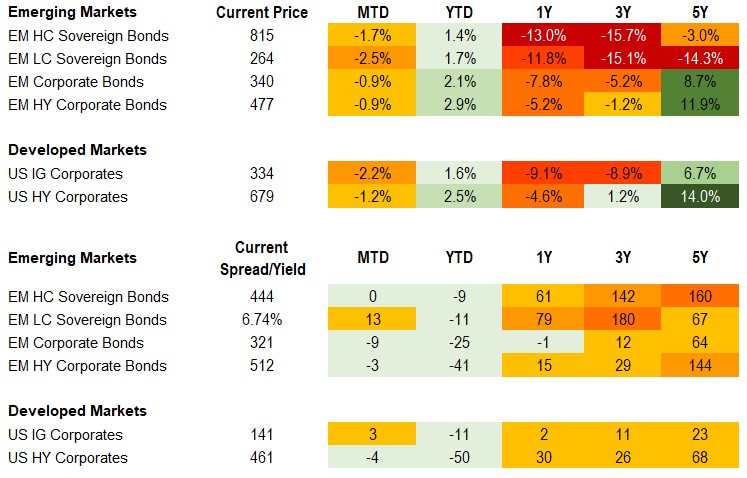
Equities
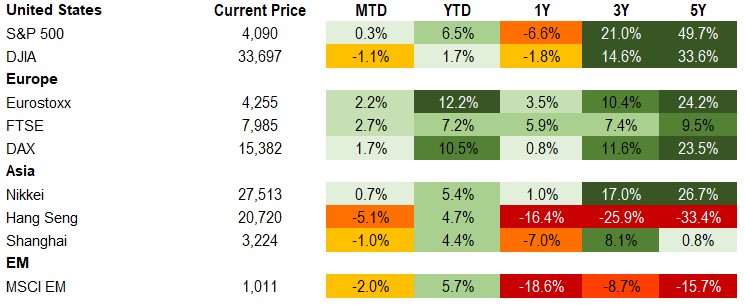
Commodities

Source for data tables: Bloomberg, JPMorgan, Gramercy. EM Fixed Income is represented by the following JPMorgan Indicies: EMBI Global, GBI-EM Global Diversified, CEMBI Broad Diversified and CEMBI Broad High Yield. DM Fixed Income is represented by the JPMorgan JULI Total Return Index and Domestic High Yield Index. Fixed Income, Equity and Commodity data is as of February 17, 2023 (mid-afternoon).
Emerging Markets Weekly Highlights
Evolution of Lula vs Campos Neto relationship set to drive market sentiment in Brazil
Event: This week in Brazil was heavy on news flow around the evolving relationship between the new Lula Administration and the Central Bank (BCB) under the leadership of its President, Roberto Campos Neto. Campos Neto gave a high-profile TV interview in which he appeared to try to decrease the temperature between the BCB and President Lula who since taking office in January has been piling pressure on the BCB to cut interest rates as soon as possible. Additionally, a much-anticipated meeting of Brazil’s National Monetary Council (the first under President Lula’s third term in office) that includes Campos Neto, Finance Minister, Fernando Haddad, and Planning Minister, Simone Tebet, resulted in no change to BCB’s inflation target for 2024.
Gramercy commentary: In a TV interview that attracted high market attention, BCB Governor Roberto Campos Neto appeared to be trying to build some bridges to Lula and the administration. Since his return to the presidency for a third time, Lula has been piling pressure on the Central Bank to cut rates as soon as possible. However, markets have been concerned that Lula’s ambitious fiscal spending plans could delay or even derail the prospects for monetary easing by BCB due to un-anchoring of medium-term inflation expectations. Campos Neto’s message to Lula was straightforward: if the administration presents a credible fiscal framework (i.e., a new fiscal rule to replace the constitutional spending cap that Lula wants to abolish) to re-anchor inflation expectations, the BCB will likely be in a position to start cutting rates soon in a constructive environment, given decelerating current inflation and the highest real interest rates across EM. This would be a win-win situation and represents the upside risk for local assets that should rally materially in that scenario, in our view. A negative scenario could materialize if Lula were to escalate fiscal populism to such a level that would make it impossible for the BCB to cut rates in 2023 and may even bring tightening of monetary policy back on the table. Also, if Campos Neto were to leave or get fired by Congress under Lula’s pressure, that would likely trigger a material risk-off across Brazilian markets. However, both scenarios carry a low probability at this stage, in our assessment.
Ghana successfully completes domestic debt restructuring
Event: The government announced that it reached 80% participation in its domestic debt deal following several rounds of negotiation and term amendments. At the same time, the January inflation print came in 70bps better than expected at 53.6% vs. 54.1% the month prior.
Gramercy Commentary: As previously written, we see a conclusion of the domestic debt process as constructive in moving forward with broader macroeconomic normalization and debt stabilization. Our base case assumed the need for a differentiated approach across local creditors given the nuanced impact on the domestic financial system, despite the associated slight reduction in debt relief relative to the initial proposal. External debt negotiations with bilateral and commercial holders should gain momentum in the aftermath of the domestic debt deal and pave the way for IMF board level approval of the $3bn EFF program. Meanwhile, the slightly softer than anticipated inflation print helps reduce the pressure for outsized rate hikes in the near-term and limit pressure on the cedi albeit inflation remains at a very elevated level and will need to be addressed with a robust macroeconomic policy mix under the IMF program.
Emerging Markets Technicals
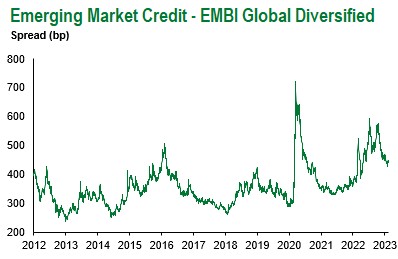
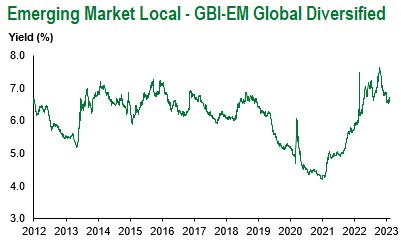
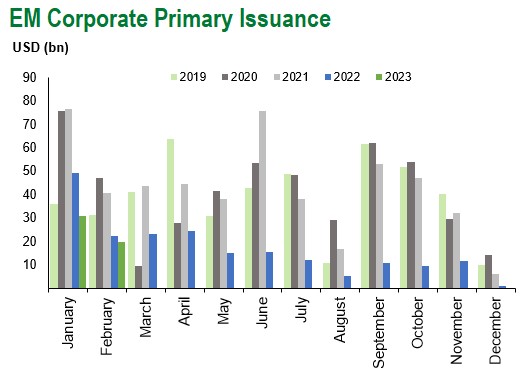
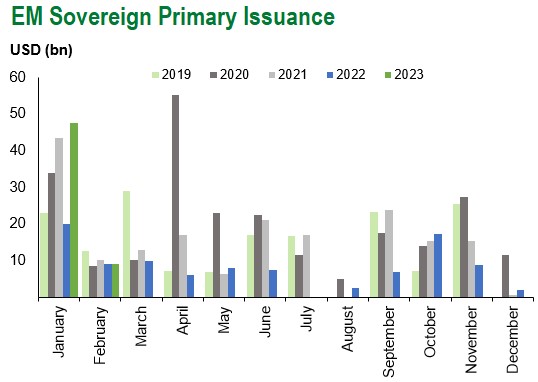
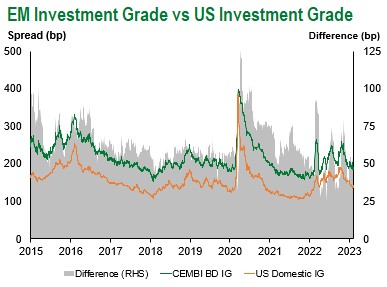
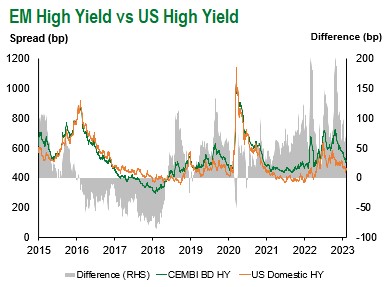
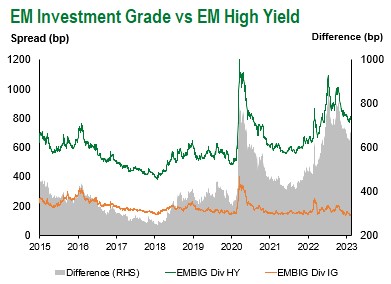
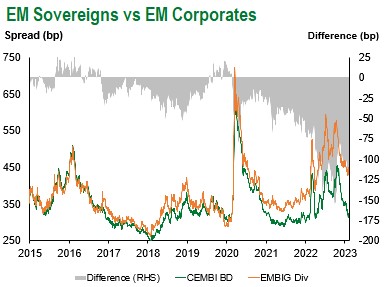
Emerging Markets Flows
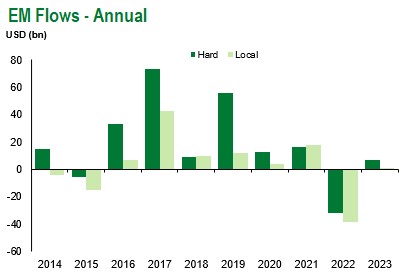
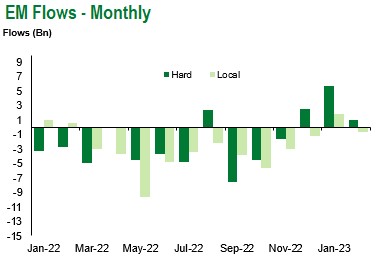
Source for graphs: Bloomberg, JPMorgan, Gramercy. As of February 17, 2023.
COVID Resources:
Johns Hopkins COVID-19 Case Tracker
For questions, please contact:
Kathryn Exum, CFA ESG, Director, Co-Head of Sovereign Research, [email protected]
Petar Atanasov, Director, Co-Head of Sovereign Research, [email protected]
James Barry, Director, Deputy Portfolio Manager, [email protected]
This document is for informational purposes only. The information presented is not intended to be relied upon as a forecast, research or investment advice, and is not a recommendation, offer or solicitation to buy or sell any securities or to adopt any investment strategy. Gramercy may have current investment positions in the securities or sovereigns mentioned above. The information and opinions contained in this paper are as of the date of initial publication, derived from proprietary and nonproprietary sources deemed by Gramercy to be reliable, are not necessarily all-inclusive and are not guaranteed as to accuracy. This paper may contain “forward-looking” information that is not purely historical in nature. Such information may include, among other things, projections and forecasts. There is no guarantee that any forecasts made will come to pass. Reliance upon information in this paper is at the sole discretion of the reader. You should not rely on this presentation as the basis upon which to make an investment decision. Investment involves risk. There can be no assurance that investment objectives will be achieved. Investors must be prepared to bear the risk of a total loss of their investment. These risks are often heightened for investments in emerging/developing markets or smaller capital markets. International investing involves risks, including risks related to foreign currency, limited liquidity, less government regulation, and the possibility of substantial volatility due to adverse political, economic or other developments. References to any indices are for informational and general comparative purposes only. The performance data of various indices mentioned in this update are updated and released on a periodic basis before finalization. The performance data of various indices presented herein was current as of the date of the presentation. Please refer to data returns of the separate indices if you desire additional or updated information. Indices are unmanaged, and their performance results do not reflect the impact of fees, expenses, or taxes that may be incurred through an investment with Gramercy. Returns for indices assume dividend reinvestment. An investment cannot be made directly in an index. Accordingly, comparing results shown to those of such indices may be of limited use. The information provided herein is neither tax nor legal advice. Investors should speak to their tax professional for specific information regarding their tax situation.
